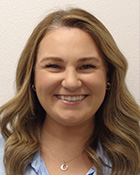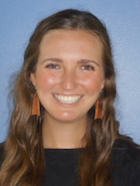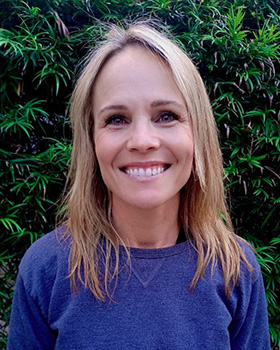 Shani Goldgrub, Au.D, CCC-A, Lead Audiologist
Shani Goldgrub, Au.D, CCC-A, Lead Audiologist
Shani has been a part of the Diagnostic Audiology team since July 2007. She is also a valuable member of the Auditory Evoked Potential and Hearing Aid Management teams. Shani earned her Doctor of Audiology from the University of Memphis in June 2007 and her Bachelor of Arts in communication disorders from Universidad de las Americas, Mexico City, in 1998. She provides support to our patients in both English and Spanish. Shani holds a Certificate of Clinical Competence from the American Speech-Language-Hearing Association, is a fellow of the American Academy of Audiology and is licensed by the state of California for audiology and hearing instrument dispensing. She primarily works at the Main Campus location.
 Page Beukelman, Au.D.
Page Beukelman, Au.D.
Page received her Bachelor of Science in speech, language and hearing (2014) as well as her Doctor of Audiology (2018) from the University of Arizona. She completed her pediatric audiology clinical training at Boston Children’s Hospital. She specializes in diagnostics, hearing aids and bone-conduction hearing devices. Page holds an audiology license in the state of California She joined Rady Children’s Hospital team in 2018 and works primarily at the Main Campus location.
 Kristina Bevill, Au.D., CCC-A
Kristina Bevill, Au.D., CCC-A
Kristina received her Bachelor of Arts with honors in speech pathology and audiology at Calvin College and completed her Doctor of Audiology at Central Michigan University in 2021. While obtaining her doctorate, she completed pediatric-focused rotations at the Medical University of South Carolina and University of Michigan, as well as completing her final year of clinical study at Rady Children’s. She specializes in diagnostics, hearing aids and vestibular disorders. Kristina holds a Certificate of Clinical Competence from the American Speech-Language-Hearing Association and an audiology license in the state of California. She works at the Main Campus location.
 Jennifer Bold, Au.D.
Jennifer Bold, Au.D.
Jen has been a part of the Diagnostic Audiology team since 2002. She completed her Doctor of Audiology from the University of Florida in 2003, her Master of Science degree in 1997 and her Bachelor of Science degree in 1995 from the University of Arizona. Jen is a fellow of the American Academy of Audiology and is licensed in the state of California for both audiology and hearing aid dispensing. She works primarily at the Main Campus location.
 Alexis Bulcao, Au.D.
Alexis Bulcao, Au.D.
Alexis completed her Doctor of Audiology from Illinois State University in 2020 and her Bachelor of Arts in Communication Sciences and Disorders from Minnesota State University Mankato in 2015. She has a passion for working with children and can provide services in English, French, and limited Spanish. She holds a Certificate of Clinical Competence from the American Speech-Language-Hearing Association, is a fellow of the American Academy of Audiology, and is licensed by the state of California for audiology and hearing instrument dispensing. Alexis joined the Diagnostic Audiology team in 2024 and works primarily at the Main Campus location
 Keri M. Colio, Au.D., CCC-A, Cochlear Implant Clinical Coordinator
Keri M. Colio, Au.D., CCC-A, Cochlear Implant Clinical Coordinator
Keri joined Rady Children’s in 2013 and works at the Main Campus location, where she serves as the cochlear implant clinical coordinator. She received her Doctor of Audiology from East Tennessee State University in 2013 following the completion of a four-year residency program. Prior to that, she earned a Bachelor of Arts in audiology from the University of Tennessee. Keri is certified by the American Speech-Language-Hearing Association. She maintains an audiologist license from the state of California and serves as a subject matter expert on the Speech-Language Pathology, Audiology and Hearing Aid Dispensers Board. Keri also serves on the board of directors for the Society of Ear Nose and Throat Advancement in Children. She works at the Main Campus location.
 Karen Faillace, Au.D.
Karen Faillace, Au.D.
Karen joined the Diagnostic Audiology team in 1990 and is a member of the Hearing Aid Management and Auditory Evoked Potential teams. She has also been a part of the Cleft Palate Team for many years. Karen is able to provide services in sign language and limited Spanish. She completed her clinical doctorate in 2005 from A.T. Still University/Arizona School of Health Sciences, her Master of Arts in 1990 from San Diego State University and her Bachelor of Arts in 1988, also from San Diego State University. She is board certified in the state of California, holds a Certificate of Clinical Competence from the American Speech-Language Hearing Association and is a current member of SENTAC (Society for Ear, Nose and Throat Advances in Children). She primarily works at the Main Campus location.
 Tara Jobin, Au.D.
Tara Jobin, Au.D.
Tara is part of the Diagnostic Audiology and Hearing Aid Management teams. She received her Doctor of Audiology from the University of Texas at Austin, where she also earned a Bachelor of Science in communication sciences and disorders in 2010. Tara holds a license in the state of California for audiology. She specializes in implantable bone-conduction hearing aids. Tara works both at the Main Campus and ENT locations.
 Andrea Kottlowski, Au.D.
Andrea Kottlowski, Au.D.
Andi joined the Diagnostic Audiology team in 2022. She received her Doctor of Audiology in 2019 from Gallaudet University in Washington, D.C., and her Bachelor of Science in 2014 from Indiana University. She holds a Certificate of Clinical Competence from the American Speech-Language-Hearing Association and is licensed by the state of California for audiology and hearing aid dispensing. Andi works at the main campus location.
 Erin M. Levy, Au.D., CCC-A
Erin M. Levy, Au.D., CCC-A
Erin has been an audiologist since 2002 and has a passion for working with children and implantable devices. She received her Doctor of Audiology in 2006 from the University of Florida, her Master of Science in audiology from Washington University (Central Institute for the Deaf) in St. Louis in 2002, and her Bachelor of Science in 2000 from St. Louis University. She holds a Certificate of Clinical Competence from the American Speech-Language-Hearing Association, is a fellow of the American Academy of Audiology, and is licensed by the state of California for audiology and hearing instrument dispensing. She is also a member of AG Bell Assocation and the American Cochlear Implant Alliance. She works at the Main Campus and ENT locations.
 Hannah Litton, Au.D.
Hannah Litton, Au.D.
Hannah Litton received her Bachelor of Arts in communication sciences and disorders from the University of Redlands in 2017 and graduated from the University of the Pacific with her Doctor of Audiology in 2020. Prior to joining Rady Children’s, Hannah completed her pediatric audiology clinical training at Stanford Children’s Health. She is a licensed audiologist and hearing aid dispenser in the state of California. She works at the Oceanside location.
 Maureen A. Miller, Au.D
Maureen A. Miller, Au.D
Maureen became a member of the Diagnostic Audiology team in July 1999. She works as part of the Hearing Aid Management team and specializes in bone-conduction hearing aids. Maureen completed a Doctor of Audiology at A.T. Still University in 2013. She earned a Master of Arts from the University of California, Santa Barbara, as well as a Bachelor of Science in speech and hearing science from the State University of New York at Plattsburgh, N.Y. Maureen holds a Certificate of Clinical Competence from the American Speech-Language-Hearing Association and is licensed with the state of California in both audiology and hearing aid dispensing. She works at the Murrieta and Oceanside locations.
 Kate (Catherine) Moyer, Au.D
Kate (Catherine) Moyer, Au.D
Kate joined the Diagnostic Audiology team in 2006. She is a member of the Auditory Evoked Potential and Hearing Aid Management teams. She has specialized experience in working with bone-conduction devices and provides support to the Craniofacial and Cleft Palate teams. She earned a Doctor of Audiology in 2007 from San Diego State University/UC San Diego and a Bachelor of Arts in communication disorders in 2003 from San Diego State University. She is a fellow with the American Academy of Audiology and holds a license in the state of California for audiology and hearing aid dispensing. She works at the Main Campus location.
 Nicholas Portugal, Au.D., CCC-A
Nicholas Portugal, Au.D., CCC-A
Nicholas received his Bachelor of Arts in Speech, Language, and Hearing Sciences (2019) from San Diego State University and went on to complete his Doctor of Audiology (2023) at San Diego State University and UC San Diego’s dual program. He completed his pediatric audiology clinical training at Rady Children’s. The research he conducts focuses on objective measures to evaluate the hearing of both adult and pediatric patients. His findings have been presented at multiple national meetings and published. Nicholas holds a Certificate of Clinical Competence from the American Speech-Language-Hearing Association and an audiology license in the state of California. Nicholas is most excited to be helping children from his local community. He works at the Main Campus and ENT locations.
 Julie Silva, Au.D.
Julie Silva, Au.D.
Julie has been a member of the Rady’s Diagnostic Audiology team since 2003. She serves as the Brainstem Auditory Evoked Response (BAER) and Inpatient Clinic Coordinator as well as the newborn hearing screening consultant for the Rady Children’s Hospital Neonatal Intensive Care Units (NICUs). She received her Doctor of Audiology from A.T. Still University, prior to that she received her Master of Arts in Audiology and Bachelor of Arts in Communicative Disorders from San Diego State University. Julie is a California board-certified audiologist and hearing aid dispenser and a member of the American Speech-Language Hearing Association. She works at the Hospital location.
 Ellen Smith, Au.D.
Ellen Smith, Au.D.
Ellen received her Doctor of Audiology in 2020 from San Diego State University and UC San Diego’s joint audiology doctoral program. Prior to that, she earned a Bachelor of Science in biology from UCLA. She holds a Certificate of Clinical Competence from the American Speech-Language-Hearing Association. She is a licensed audiologist and hearing aid dispenser, and works at the Murrieta location.
 Kristen Stanton, Au.D., CCC-A
Kristen Stanton, Au.D., CCC-A
Kristen received her Doctor of Audiology from Indiana University, where she also earned a Bachelor of Music in Trumpet Performance. Prior to joining Rady Children’s Hospital, Kristen completed her audiology externship at Cleveland Clinic. She holds a Certificate of Clinical Competence from the American Speech-Language-Hearing Association and is licensed by the state of California for audiology and hearing instrument dispensing. Kristen is part of the cochlear implant, hearing aid and vestibular evaluation management teams. She works at the Main Campus and Escondido locations.
 Ann Sumida, Au.D
Ann Sumida, Au.D
Ann has been an audiologist since 1991 and joined the Diagnostic Audiology team in 1996. Ann obtained a Doctor of Audiology in 2013 from A.T. Still University, a Master of Arts from the University of Massachusetts in 1991, and a Bachelor of Science from the University of California, Berkeley in 1986. She is California board-certified and a current member of the American Academy of Audiology and American Speech-Language Hearing Association. She works at the Main Campus location.
 Janina Woodman, Au.D
Janina Woodman, Au.D
Janina has been a part of the Diagnostic Audiology team since 2000. She is also a valuable member of the Hearing Aid Management team. Janina received her Doctor of Audiology from AT Still University in 2012, her Master of Science degree in 1995 from Purdue University, and her Bachelor of Arts from the University of Colorado, Boulder in 1991. She holds a certificate of clinical competence from the American Speech-Language-Hearing Association and is licensed by the state of California. She works at both the Escondido and San Diego locations.
Support Staff

Olivia Carrillo, M.A, Cochlear Implant Community and Educational Liaison, Research Analyst
Olivia has a Master of Arts in Speech, Language, and Hearing Sciences with a Concentration in Communicative Sciences from San Diego State University. Prior to that, she earned her Bachelor’s degree in Speech, Language, and Hearing Sciences from San Diego State University. Olivia’s goal is to provide support for DHH children in the school setting alongside assisting numerous research studies at RCHSD. Olivia is passionate and dedicated to supporting underserved families and their needs. She works at the Main Campus location.

Zindy Garcia, Hearing Aid Coordinator
Zindy joined Rady Children’s in April 2011 and has worked in Developmental Services supporting multiple departments. She has 25+ years of experience in administrative roles and has her degree in business management with a certificate in human resources management. Zindy is a valued member of our team and works at the Main Campus. location.
 Julie K. Purdy, Ph.D., CCC-A, Audiology Manager
Julie K. Purdy, Ph.D., CCC-A, Audiology Manager
Julie has been a part of the Diagnostic Audiology team since 2007 and became the manager of audiology in 2014. She earned a doctorate of philosophy at the University of Utah in 1990, specializing in multicultural audiology and aging. She earned her Master of Science in 1985 and her Bachelor of Arts in 1983, both in communication disorders from Brigham Young University in Provo, Utah. Julie holds a Certificate of Clinical Competence from the American Speech-Language-Hearing Association, is a fellow of the American Academy of Audiology and is licensed by the state of California. She primarily works at our Main Campus location.
 Isabelle Estrella, Audiology Aide
Isabelle Estrella, Audiology Aide
Isabelle joined our Audiology team in December 2021. She graduated San Diego State University with a Bachelor of Arts degree in speech, language, and hearing sciences, with a minor in psychology, and holds an associate’s degree in behavioral and social sciences. Isabelle is working with Developmental Services in providing support at our Main Campus location. Her goal is to support the Audiology Team to improve patients’ lives.

Alyssa Torres, Audiology Aide
Alyssa joined our team in May 2021. She graduated from Cal State San Marcos with a Bachelor of Science degree in speech-language pathology and plans to become a speech-language pathologist. Alyssa is working with Developmental Services in providing support at our Murrieta location. As a former patient at Rady Children’s, she is excited to work for the hospital that saved her life!

Donna Whitlock, Audiology AideDonna has been a member of the Audiology team since May 2016. She has worked with Developmental Services since 2015 supporting all disciplines. Donna has her degree in early childhood education from El Camino College in Torrance. She owned her own preschool for many years and worked as a lead teacher at the Cal State San Marcos Children’s center. She works at our Oceanside location.